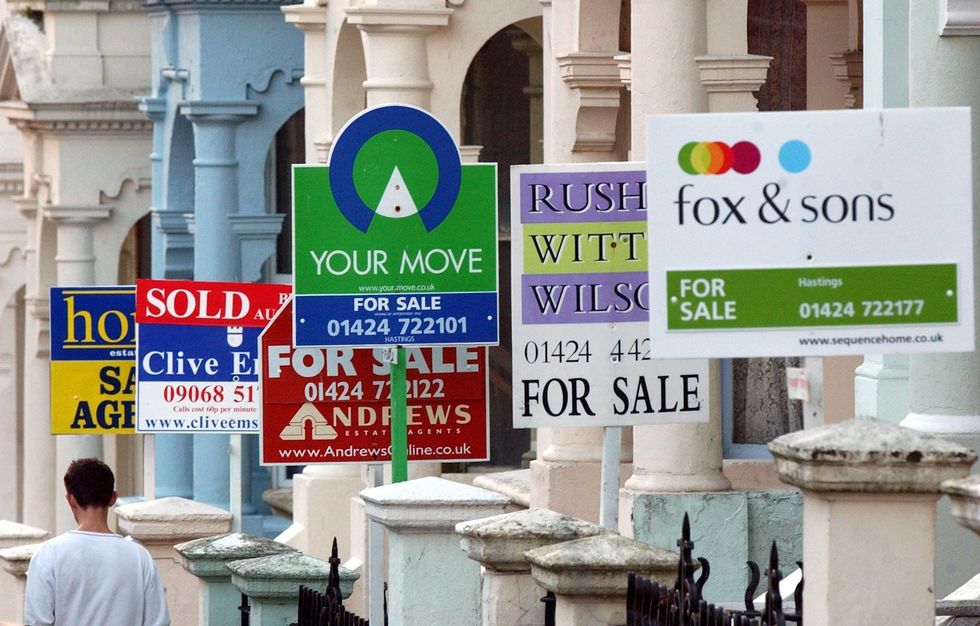The areas with the most cash property purchases have been shared
PA
Cash property purchases have plummeted in some parts of the country, whereas other regions have seen these transactions soar. What is happening in your area?
Don't Miss
Most Read
Trending on GB News
Cash property purchases across various UK regions have seen a significant decrease from 2013 to 2023, with some areas experiencing dramatic drops.
New research conducted by UK mortgage broker SPF.co.uk, utilising data from the HM Land Registry, revealed the extent of this trend.
Harlow, Essex, has emerged as the area with the most substantial decline, witnessing a staggering 44.9 per cent fall in cash purchases over the decade.
This Essex town has seen the proportion of cash sales plummet from 26.3 per cent of all property purchases in 2013 to just 14.5 per cent in 2023.

Cash purchases are on the decline
PEXELSThe study focused on the change in the portion of all sales that were cash purchases within the decade, rather than the total number of properties bought in cash. This approach provides insight into shifting buyer behaviours and market dynamics across different regions.
The top 10 areas with the largest decrease in cash property purchases
- Harlow (-44.9%)
- Barking and Dagenham (-41.4%)
- Thurrock (-40.5%)
- Slough (-39.7%)
- Luton (-35.2%)
- Crawley (-30.8%)
- Medway (-30.5%)
- Stevenage (-30.3%)
- Waltham Forest (-28.7%)
- Swindon (-28.4%)
These regions, predominantly located in the South East and around London, have experienced significant shifts in their property markets.
Barking and Dagenham, for instance, saw cash purchases fall to just 9.8 per cent of all property sales in 2023, down from 16.7 per cent in 2013. Thurrock, Essex, witnessed a drop from 21 per cent to 12.5 per cent in the same period.
Harlow's dramatic decrease in cash property purchases reflects broader trends in the region. According to ONS data, the average house price in Harlow stands at £309,000. This significant cost may be contributing to the decline in outright purchases.
In stark contrast, Inverclyde in Scotland has experienced the largest increase in cash property sales, with a 39.4 per cent jump. The percentage of homes bought outright in Inverclyde rose from 36 per cent in 2013 to 50.1 per cent in 2023.
This disparity highlights the regional variations in the UK property market. While areas around London and the South East are seeing fewer cash purchases, some regions further north are witnessing an opposite trend.
Inverclyde's average house price is considerably lower at £123,000, potentially making cash purchases more accessible for buyers in this area.
The top 10 areas with the largest increase in cash property purchases
- Inverclyde (39.4%)
- Hart (26.1%)
- Solihull (25.4%)
- Rushcliffe (22.9%)
- Redcar and Cleveland (21.9%)
- City of Aberdeen (21.34%)
- Kensington and Chelsea (21.29%)
- Gateshead (21%)
- City of London (20.3%)
- Na h-Eileanan Siar (20%)
This list showcases a diverse range of locations across the UK, from Scottish regions to affluent London boroughs. Notably, Inverclyde's 39.4 per cent increase stands in stark contrast to Harlow's 44.9 per cent decrease.
The average house price in Inverclyde is £123,000, with first-time buyers paying around £100,000. This affordability may contribute to the area's growing popularity for cash purchases.
LATEST DEVELOPMENTS
 Home improvements could boost a property's value by up to 20 per centPA
Home improvements could boost a property's value by up to 20 per centPAChief Executive of SPF.co.uk's Private Clients Mark Harris commented: "Outside London, there has been a growing trend of cash purchases post-pandemic, perhaps due to the savings some people were able to build up during Covid and choosing to use these rather than opt for more expensive borrowing.
"Cash sales overall have decreased, with ONS data showing 186,000 sales in England last year, down from 254,000 in 2013, which may be down to higher property prices and the elevated cost of living, leaving people with less disposable cash.
"With properties in London and the south-east costing significantly more than elsewhere, they tend to be unaffordable for certain cash buyers such as retirees who prefer to own outright."








